One possible cause for the problem report described, is a level mismatch between ground at the PC and at the industrial equipment side. This comes from similar personal experiences designing for industrial applications.
Either that, or some significant transients traversing the connections - RS232 is more forgiving than USB in some ways.
One thing to check is whether the two grounds are connected, and even if they are, whether there is significant enough potential difference for measurable sustained current, DC or transient, to be passing along the ground to ground connection / cable shield.
A resolution would be a galvanically or optically isolated implementation: The industrial sensors / actuator control lines to be isolated from the PC side through (a) transformer coupling, or (b) optocouplers, depending on the specific design requirements. The microcontroller device could be placed on either side of the isolation barrier.
In practical terms, the easiest way to implement this, once the need for isolation is established, is to use a standalone USB isolation device such as this one from Olimex, on the PC to board USB connection:
 .
.
Another such device is the USB Port Guardian, quite a bit better packaged, but essentially similar in functionality.
Neither of these devices seem to survive well in extremely harsh environments though - we have faced some device failures in deployed set-ups, but your environment may not be as challenging.
At a design level, Analog Devices offers single-package USB isolation parts in their iCoupler line. Incorporating such a part into the design is not very complicated, and the Analog Devices design support team is very proactive if you need help.
Specific to the 3 points in the question:
- The problem is most likely to be design-specific as noted above, rather than an issue with the FTDI part.
- This would require specifying the actual industrial envornment factors, i.e. temperature et cetera. Maxim and other manufacturers have parts specified for industrial temperature ranges, but if your PC is in there, and presumably its operators, the environment is probably not that harsh.
- The jury is out on this one: There are proponents of both the FTDI and the integrated USB MCU schools of thought. The actual cost advantage, including design cost, would vary situationally.
 .
.